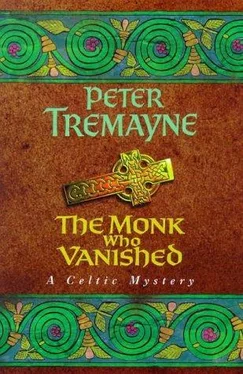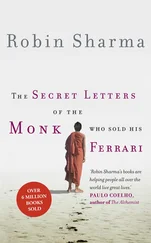Peter Tremayne - The Monk Who Vanished
Здесь есть возможность читать онлайн «Peter Tremayne - The Monk Who Vanished» весь текст электронной книги совершенно бесплатно (целиком полную версию без сокращений). В некоторых случаях можно слушать аудио, скачать через торрент в формате fb2 и присутствует краткое содержание. Жанр: Исторический детектив, на английском языке. Описание произведения, (предисловие) а так же отзывы посетителей доступны на портале библиотеки ЛибКат.
- Название:The Monk Who Vanished
- Автор:
- Жанр:
- Год:неизвестен
- ISBN:нет данных
- Рейтинг книги:3 / 5. Голосов: 1
-
Избранное:Добавить в избранное
- Отзывы:
-
Ваша оценка:
- 60
- 1
- 2
- 3
- 4
- 5
The Monk Who Vanished: краткое содержание, описание и аннотация
Предлагаем к чтению аннотацию, описание, краткое содержание или предисловие (зависит от того, что написал сам автор книги «The Monk Who Vanished»). Если вы не нашли необходимую информацию о книге — напишите в комментариях, мы постараемся отыскать её.
The Monk Who Vanished — читать онлайн бесплатно полную книгу (весь текст) целиком
Ниже представлен текст книги, разбитый по страницам. Система сохранения места последней прочитанной страницы, позволяет с удобством читать онлайн бесплатно книгу «The Monk Who Vanished», без необходимости каждый раз заново искать на чём Вы остановились. Поставьте закладку, и сможете в любой момент перейти на страницу, на которой закончили чтение.
Интервал:
Закладка:
‘If it were true that the slain monk at Cashel was Brother Mochta, then it might make some sense. But Brother Madagan insists that Mochta wore your Irish tonsure and not the tonsure of Rome. Hair cannot grow or be changed in a day. Besides, the innkeeper at the Well of Ara said hair was growing to disguise the tonsure when he stayed there a week ago.’
‘True enough. But do you have an explanation for the accuracy of the description of the body at Cashel and that of Brother Mochta? A description which fits even down to the tattoo on his arm.’ Fidelma’s s eyes twinkled a moment. ‘That is also a certainty. We can be absolutely certain only about things we do not understand.’
Eadulf raised his eyes to the ceiling. ‘A saying of the Brehon Morann no doubt?’ he asked sarcastically.
Fidelma ignored him as she looked round the room.
‘I believe that whoever did this, whether it was Brother Mochta orsome other person, arranged these things carefully. Look at the way the mattress is positioned so that anyone who was not blind would see the bloodstain. Now a mattress, in a struggle, might well fall that way but it does seem contrived. And in a struggle, why would the clothes from that cupboard be taken out and strewn around the room?’
Eadulf began to realise the detail which her examination of the room had picked up.
‘Did you notice the arrow on the bedside table?’ Fidelma asked him.
Eadulf gave an inward groan.
He had noticed it but only as part of the debris of the room. Now that he focused on it, he realised the significance of the markings on the flight. It was the same type of arrow which had been carried by the archer during the assassination attempt; the same style of arrow which Fidelma was carrying and which had been identified as being made by the fletchers of Cnoc Áine.
‘I see it,’ he answered shortly.
‘And what do you make of it?’
‘Make of it? It is the shaft of an arrow which has been snapped in two. The end half of the shaft with the flight has fallen on the table.’
‘ Fallen ?’ Fidelma’s voice raised a little in disbelief. ‘It is laying there so clearly exposed that it seems to have been placed there for anyone to see. If it had been broken in some struggle, where is the other half?’
Eadulf s eyes fell to the floor, searching. He examined the room carefully and saw nothing of it. ‘What does it mean?’
‘You know as much as I do,’ Fidelma replied indifferently. ‘If the room has been carefully arranged for us … well, arranged for whoever was meant to gaze on it … what message is it supposed to give?’
Eadulf stood and folded his arms, gazing around before delivering his answer. ‘Brother Mochta has disappeared. The room is supposed to make people think that he has been removed from his chamber in a violent struggle. The bloodstain on the mattress and the disorder point to this. Then there is a broken arrow on the bedside table … ah, that might signify that the arrow was broken when an assailant plunged it into the body of Mochta. The piece with the arrow head was left in Mochta while the end of the arrow with the flight was broken and tossed onto the table.’ He glanced at Fidelma for her approval.
‘Excellently done, Eadulf. That is precisely the message we have been asked to believe. Yet as the scene was so carefully preparedwe must look behind this message for the real significance of this chamber.’
For the first time she entered it and began to examine it foot by foot. Then she picked up the broken arrow and placed it in her marsupium.
‘I do not think it will tell us much until we have garnered more facts.’
She then examined the writing materials in the corner and the pieces of vellum.
‘Brother Mochta wrote a fair hand. He seems to have been writing a Life of Ailbe. ’ She began to read from one of the pieces of vellum: ‘“He was called by Christ to his repose in the hundredth year of his life, as recorded in the Annals of Imleach which were began in that year of Our Lord 522.”’ She paused. ‘The rest appears to be missing. But here is another fragment.’ She read again: ‘“The repose of Ailbe has been distorted by the scribes of the north for they do not wish to acknowledge his appearance in Muman before Patrick of Armagh.”’
‘Do these writings have significance?’ queried Eadulf.
‘Perhaps,’ she replied, rolling the pieces of vellum up before placing them in her marsupium. Then she glanced around again. ‘I do not think this chamber will reveal any more secrets to us. Let us go.’
She locked the room after they left, for Brother Madagan had left the key in the door. They returned to the refectory. Outside, a dozen or more male and female religious had gathered, wrapped in long cloaks, carrying bundles and each holding a pilgrim’s staff. Abbot Ségdae was there in front of them, standing with raised right hand, his thumb and third finger pressed against one another so that the first, second and fourth finger were raised to symbolise the Holy Trinity in the Irish fashion.
He delivered the Blessing in Greek, that being considered the language of the Holy Gospels.
Then the pilgrims, two by two, shouldered their bundles and set out towards the open abbey gates. Their voices rose in a joyful chant as they did so.
Cantemus in mni die
concinentes uarie,
conclamantes Deo dignum
hymnum sanctae Mariae
‘Let us sing each day, chanting together in varied harmonies, declaiming to a God a worthy hymn for holy Mary,’ muttered Eadulf, translating the words.
Soon the singing column of pilgrims had passed through the abbey gates, continuing their pilgrimage, their voices receding beyond the walls.
As they stood watching a burly man approached them. He was of average height, well muscled, solidly built with unexceptional grey-brown hair. He wore a leather jerkin over his workmanlike clothes and carried a short sword at his belt. His eyes were bright and keen. His features were ruddy and a little too fleshy to retain the handsomeness he might have enjoyed in his youth. He had the air of acquired wealth about him; acquired because he wore his wealth ostentatiously. He was bejewelled, which seemed at odds with his choice of clothing. Someone to whom such richness came naturally would not have been so tasteless with their wealth. Fidelma suppressed a smile. She suddenly had a vision of this pretentious character wearing a sign around his neck with the legend: ‘Lucri bonus est odor — sweet is the smell of money’. She wondered where the line came from and then remembered it was from Juvenal’s Satires . Well, she was sure that the man would not object to the motto.
‘Are you the Lady Fidelma?’ the man asked, his bright eyes narrowing slightly as he examined her.
Fidelma inclined her head in greeting. ‘I am Fidelma of Cashel,’ she replied.
‘I have heard that you have been asking after me. My name is Samradán of Cashel.’
Fidelma met the gaze of his pale, bright eyes and held it. It was the Cashel merchant that let his gaze dart away first.
‘If there is anything I can help you with?’ Samradan shifted his weight uncomfortably.
Fidelma suddenly smiled disarmingly. ‘Did you know Brother Mochta?’
The merchant shook his head. ‘The monk who has vanished? Everyone is talking about it here at the abbey. No, I did not know him. I traded only with Brother Madagan as the steward of the abbey and, of course, with the abbot himself. I never met Brother Mochta, at least the name never registered with me if I encountered him in the abbey.’
‘You keep a warehouse at Cashel?’
The merchant nodded warily. ‘By the market square, lady. My house is in the town as well.’
Читать дальшеИнтервал:
Закладка:
Похожие книги на «The Monk Who Vanished»
Представляем Вашему вниманию похожие книги на «The Monk Who Vanished» списком для выбора. Мы отобрали схожую по названию и смыслу литературу в надежде предоставить читателям больше вариантов отыскать новые, интересные, ещё непрочитанные произведения.
Обсуждение, отзывы о книге «The Monk Who Vanished» и просто собственные мнения читателей. Оставьте ваши комментарии, напишите, что Вы думаете о произведении, его смысле или главных героях. Укажите что конкретно понравилось, а что нет, и почему Вы так считаете.












